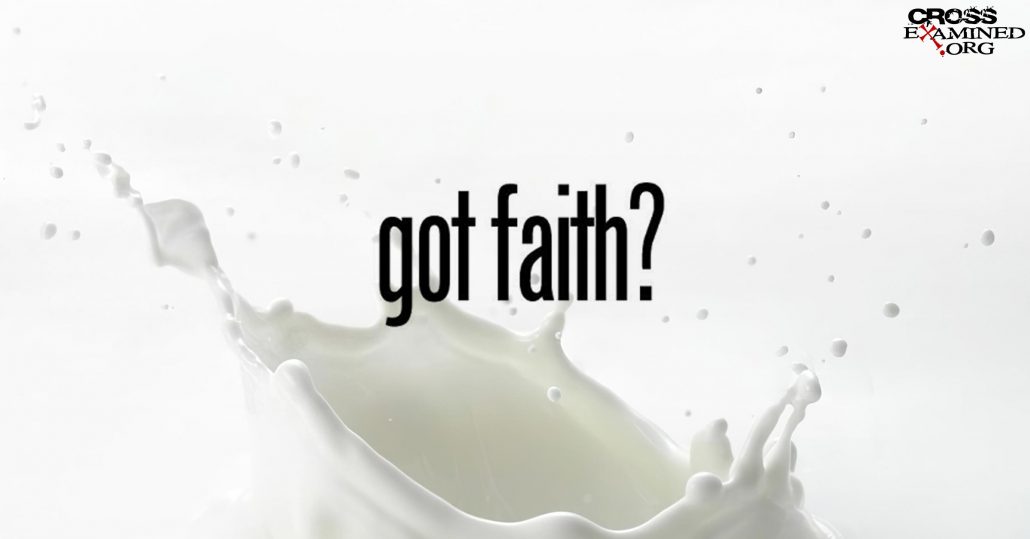By Al Serrato
Sitting in traffic the other day, I saw once again the bumper sticker “Got Faith?” It’s catchy, in a way, and in this age of sound bites, I can guess why people find it useful. Perhaps it’s a good discussion generator, a way to invite a question or a response. But Christians should be careful to understand the unintended effect words like “faith” have on those whose worldview is intentionally secular.

When we borrow from the famous milk commercial for a slogan, we risk reducing faith to a commodity – like milk. Yes, we need it, and we can acquire it, and if we do, others things in life may go better, like the way cookies taste better with milk. But is faith a commodity that we can acquire? Or is it something that all of us already have? Something we already make use of?
I recently talked to an atheist friend about these ideas. She told me that in her view, faith and reason are opposites. Faith, she said, means accepting things you can’t understand or explain, and reason, by contrast, is the opposite, accepting only those things you can understand and explain. With this view of the world, she will never be open to considering God, because by her definition to try to do so would be unreasonable. Those who “got faith” may be comforted, but they have nothing to tell her. Indeed, when she thinks about it, she feels a bit sorry for the “faithful,” because they’ve stuck their heads in the sand. They may feel safe and warm, she accepts, but the price of “not seeing things the way they really are” is just too high.
A more productive approach might be to let the secularist see that she is using “faith” as well, and to consider whose faith is more rationally based. The first step, of course, is to clarify this misunderstanding about what “faith” actually means. I would suggest a definition of “faith” as the act of trusting in something that you cannot know with complete certainty. It contains an action part – trusting – and a standard of proof part, for lack of a better term – the degree of certainty you attach to your conclusion. Contrary to my secular friend’s view, the opposite of faith is not reason, it is disbelief. In other words, to lack faith in something is to believe that what is posited is not in fact true, that it does not conform to the way things actually are. I don’t have “faith” that positive thinking will always allow me to achieve my goals. It doesn’t hurt to practice positive thinking, of course, but I do not actively trust that things actually work that way. In some instances, to lack faith would mean to go even further, to believe that the opposite is probably true. I lack faith in my ability to leap over a tall building because I know the opposite to actually be true.
Reason, by contrast, is not an act of trusting; it is act of thinking, a process by which we arrive at conclusions based upon evaluating evidence that we receive through our senses. It can be inductive or deductive; it can be sound or fallacious. But in the end, it is simply a tool that we have access to through the use of our minds, much like the tool of vision, hearing, or language acquisition. These things are simply available to any human being with a normally functioning mind. The opposite of reason is not faith, it is irrationality. If I conclude, for instance, that a set of feathered wings will allow me to take flight, I am proceeding irrationally because the available evidence establishes that this simply cannot work, however much “trust” I wish to place in what I am attempting.
Far from being opposites, then, reason and faith coexist in a continuum, in which knowledge moves from things that are definitely known through observable evidence (trust with high certainty) to things that are not definitely known but highly likely to be true (trust with less certainty) to matters that are entirely speculative and can be taken only “on faith” (trust with little or nothing to support). So faith in God, like any other conclusion a person reaches, is always the product of reason, because reason is simply the only way anyone can arrive at a conclusion. What distinguishes sound faith from foolish faith is the strength of the evidence that supports the conclusion and the validity of the reasoning process that was used.
Let’s apply this approach to a real-world example, say a wife wondering whether her husband is worthy of her trust. Because she cannot be with him all the time, she cannot know for certain whether he is cheating on her. But she is not totally without evidence, either. You would not say to her that she simply has “faith,” as if she has no reasons whatsoever for her beliefs. Instead, you would view that situation as a continuum of knowledge. In other words, her “faith” can be soundly based on available evidence – as in the situation where through long term observation and knowledge of the character, belief system and conduct of her husband, she can be confident in placing her trust. Or her “faith” can be foolish – as in the situation where the husband claims to be true but has shown through prior behavior and through comments that he is not likely to withstand the temptation to stray. This example shows two things: one, that faith is something we all use, even without necessarily thinking about it, because as limited beings we cannot know everything with certainty; and two, that the certitude of one’s faith depends on the facts and rationale that support the faith. In this example, the one rests her faith on logic and reason, while the other holds it in spite of logic and reason.
Faith and reason are not inherently in conflict, as many secularists seem to believe. While faith requires a step beyond what can be known with complete certainty, it is not irrational to take that step, depending on the strength of the evidence to support it. Thoughtful and intelligent people throughout the ages have found no conflict in accepting that God exists and placing their trust in him.
As believers, we need to prepare ourselves to show others today that this is still the case.
Recommended resources related to the topic:
Forensic Faith for Kids by J. Warner Wallace and Susie Wallace (Book)
Defending the Faith on Campus by Frank Turek DVD and Mp4 This is part of the complete package promote one or the other
Defending the Faith on Campus Complete Package by Frank Turek DVD
I Don’t Have Enough Faith to Be an Atheist (Paperback), and (Sermon) by Norman Geisler and Frank Turek
Al Serrato earned his law degree from the University of California at Berkeley in 1985. He began his career as an FBI special agent before becoming a prosecutor in California, where he continues to work. An introduction to CS Lewis’ works sparked his interest in Apologetics, which he has pursued for the past three decades. He got his start writing Apologetics with J. Warner Wallace and Pleaseconvinceme.com.


















Facebook Comments